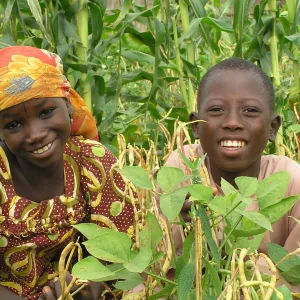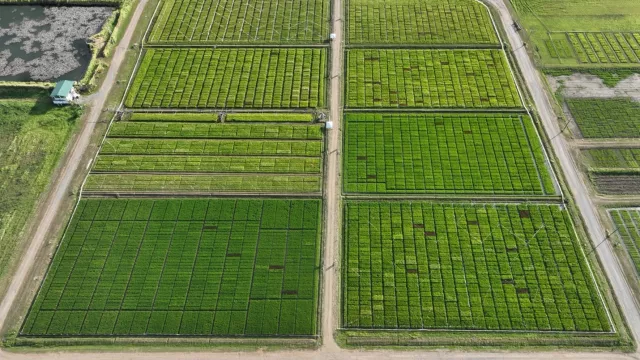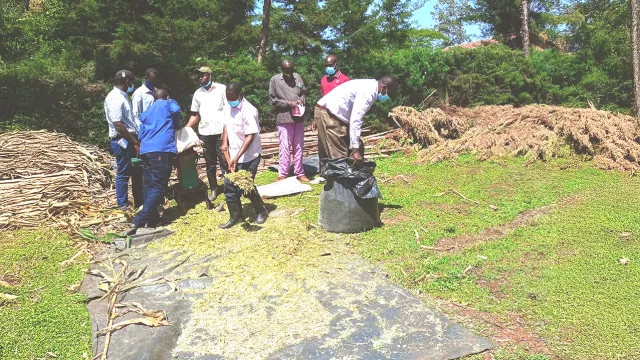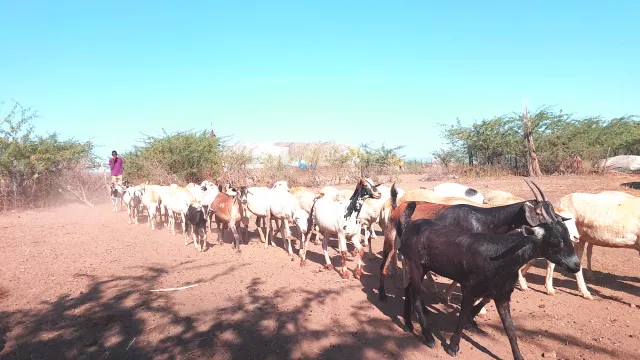West and Central Africa

About
The West and Central Africa (WCA) region comprises various ecological areas, from the sub-humid and mostly dry Guinea and Sudan savanna in the north to the more southern humid forests that receive ample rainfall in the south. The dominant agroecological zones in the Central Africa region are the humid forest and semi-arid tropics, which are host to some of the last remaining primary forests in Africa. The most prominent farming systems are forest-based, root crop systems, cereal-root crop systems, and tree crop systems.
CGIAR works across the following countries in the WCA region: Benin, Burkina Faso, Burundi, Cameroon, Congo, Côte d’Ivoire, Democratic Republic of Congo, Gabon, The Gambia, Ghana, Liberia, Mali, Nigeria, Rwanda, Senegal, Sierra Leone, and Togo.
The Regional Integrated Initiative for WCA is focused on Transforming Agri-Food Systems for the region. CGIAR’s vision of success for the WCA region entails strong research for development capacity in key farming systems within the major agroecological zones and the establishment of high-value crops and enterprises suited to different impact zones. This involves farmers in various climates adopting area-specific innovations: for example, cereal, cowpea, and livestock integration in the dry savannas, consolidated gains for cassava in lowland areas, and enhanced and diversified maize-legume farming system integration in the moist savannas.
Work in this region is further coordinated by the Regional Director for Continental Africa.
Challenges and Opportunities
West Africa
- Rural poverty is a persistent challenge in West Africa, underscored by ethnic and gender disparities.
- Weak structures and institutions result in an insecure land tenure system, and failures in agricultural policies, impacting food systems.
- West Africa can leverage the advantage of its strong youth workforce and access to regional and international market destinations.
- Increased donor and government support, as well as the presence of strong multisectoral organizations, offer opportunities for agricultural research for development.
Central Africa
- High population growth rates and low productivity of agricultural resources pose challenges for food systems in Central Africa.
- Weak land tenure systems, ethnic clashes and political conditions are a source of instability.
- As in West Africa, rural poverty is a persistent challenge.
- Strong innovations and system synergies are already delivering impact in Central Africa. Opportunities exist to scale these successes and achieve wider impact through partnerships and engagement in research and policy.
- Central Africa can leverage the advantage of access to regional and international markets, and an ecosystem of strong multisectoral organizations.
Research and Action
Responding to regional demands and expectations, CGIAR’s work in West and Central Africa will:
- Improve livelihoods, lifting 11.5 million people out of poverty.
- Enhance food and nutrition security.
- Increase employment.
- Preserve natural resource integrity, revitalizing 7.5 million hectares of farmland across Africa.
Partners
For the implementation of CGIAR operations in WCA, partnerships at multiple levels are key. In addition to the peer relationships linking CGIAR and National Agricultural Research and Extension Systems (NARES), strong engagement and integration are pursued with African regional and continental bodies, such as the Africa Union Commission (AUC), Forum for Agricultural Research in Africa (FARA), the Economic Community of West African States (ECOWAS), the African Forum for Agricultural Advisory Services (AFAAS), the West and Central African Council for Agricultural Research and Development (CORAF), and the Association for Strengthening Agricultural Research in Eastern and Central Africa (ASARECA).
The need for strategic partnerships goes beyond traditional research partners to include partnerships with intermediation organizations involved in delivery and scaling of research products and technologies for achieving impact. This includes strengthening engagement with the private sector and exploring private-public-producer engagement models. Engagement with youth in agribusiness and agricultural entrepreneurship will also be deepened as part of the delivery framework toward impact at scale.
News
-

Plant breeding is a critical tool in the fight against climate change
Fighting climate change requires a comprehensive strategy that spans energy, transport, and, crucially, food and agriculture. Halting deforestation...
-

How citizen science is transforming pastoral resilience
In northern Kenya, KAZNET - a CGIAR digital platform - is empowering herders to collect, share, and act on real-time data about rangelands, markets,...
-

Bridging silage quality gap: A study with smallholder dairy farmers
Silage is vital for Kenya’s smallholder dairy farmers, yet poor quality limits productivity. A CGIAR / ILRI demand-driven study in Nandi and Bomet...
-

Hidden in Plain Sight: Pastoralist ‘pioneers’ redefining resilience
Pastoralist communities in Ethiopia are redefining climate resilience through locally developed practices in animal health, grazing, and forage...
Publications
-
Progress Report Ethiopias Partnership for Accelerating Agricultural Solutions Scaling PAASS
-
Seasonal variation in mosquito abundance and environmental predictors in semipastoral southern Kenya implications for endemic Rift Valley fever
Background: Ecological variables that vary across time and space shape mosquito populations, creating microenvironments that can become disease...
-
Impact of invasive weed Parthenium hysterophorus Asteraceae on mosquito abundance and plantfeeding behavior in an arboviral endemic region in Kenya
Background: Invasive alien species (IAS) are rapidly altering ecosystems, undermining biodiversity, ecosystem processes, and interspecies...
-
Knowledge attitudes and practices of women related to human and animal feces management in Ethiopia Evidence for strengthening water sanitation and hygiene WaSH initiatives
Background: Water, sanitation, and hygiene (WaSH) programs aim to prevent feco-oral disease transmission, but their effectiveness in low- and...

